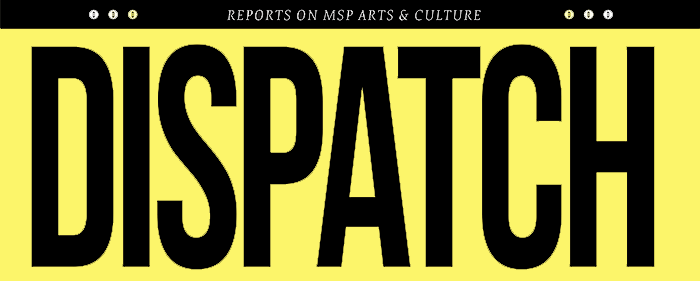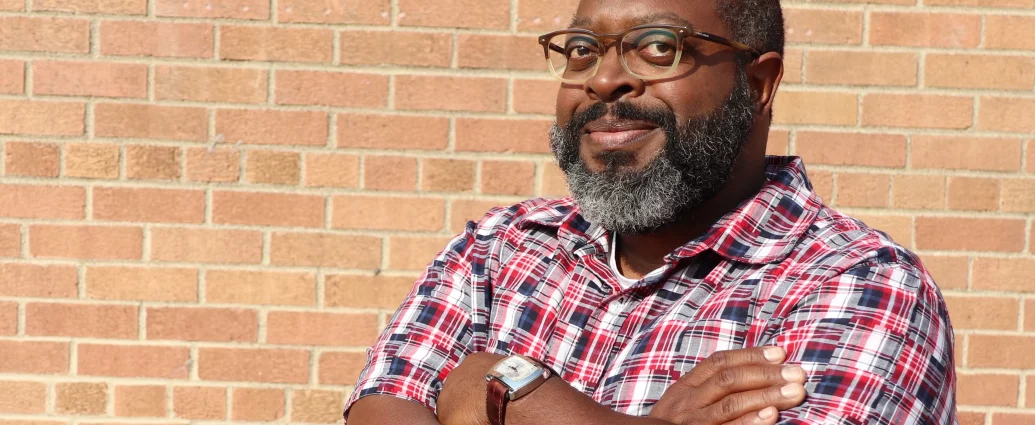The agony, the joy, the suffering, the success . . . putting art out into the world is never an easy thing. But how is it after the fact, when what you make has been out there for awhile? On the one-year anniversary of the release of his lauded work Worldly Things—a finalist for the 2022 Minnesota Book Award—among other awards, DISPATCH checks in multi-faceted writer Michael Kleber-Diggs to see what it’s like to have an accomplished one-year-old book and how he’s stayed so prolific, even after the release.
A year has passed since you released your debut poetry collection, Worldly Things, which is now available in paperback. And what a year of ups and downs. How’s the last twelve months been for you personally?
Mostly wonderful. I share that with some shyness and a little bit of worry. I don’t want to anger any gods. I see the last year in many ways as a continuation of 2020 and 2021. Our communities are still dealing with the pandemic, with the fight for racial and gender equity – the fight for equity for everyone, and we’re confronting political instability caused by anti-democratic movements here in America. At present, I feel fortunate within all those efforts to cause harm. I’m troubled and sad at times. I’m tired sometimes, and I almost always feel resolved to fight. When I’m among my family – my birth family and my chosen families – I feel blessed and grateful. We’re all doing alright; we’re holding up alright. We’re supporting each other and really checking in. My family of relatives and friends allow me to feel fortunate.
What about professionally after the release of the collection and being a finalist for the 2022 Minnesota Book Award in Poetry and appearing on the New York Times Book Review “New & Noteworthy Poetry” Selection?
Okay, so I saw a Tik Tok video this morning that kind of frames my answer here. It was a clip of the writer Elizabeth Gilbert talking about the difference between “hobby,” “job,” “career,” and “vocation.” Essentially she was saying hobbies are things we do just for fun—no stakes. Jobs are necessary to make the rent and have healthcare. Careers are jobs we’re passionate about, like connected to mission, and vocations are our calling—the universe saying ‘this is for you.’
I’ve been a writer since 4th grade. That’s my earliest memory of writing for fun. It’s something I’ve enjoyed for as long as I can remember. For many, many years it was a hobby. Somewhere along the way it became my vocation. It took me a long time to see it and even longer to claim it. Right now, writing is my job. It’s a job I enjoy more than any other job I have had and more than any job I can imagine. I do a lot of writing-related things to pay the rent, while I reach the stability we think of as career and while I work toward the ability to devote more time to projects I’m truly passionate about—my own writing work, books and things like that.
When I began to send Worldly Things out for publication consideration, I imagined a modest debut. It’s a poetry book—one I love a lot, one that benefitted from a lot of help and guidance from mentors and friends—but it’s a poetry book. I imagined cozying up with a university press and selling a couple hundred copies to people who know me. My ability to contemplate writing as a career has been advanced significantly because I won the Max Ritvo Poetry Prize and my book was published by Milkweed Editions and it was published in a year when the pandemic didn’t affect its reach as much as it would have the year before. I feel lucky—just tremendously lucky. I’m humbled and grateful. From time to time when I think about it, I find myself overwhelmed by my good fortune.
Artists often look back at their art with perspectives like ‘Well, this certainly could’ve gone differently’ or ‘I’m very over this after so much time working on it’. How has your relationship to Worldly Things changed?
Oh, sure. I see the book differently after spending so much time with it during this past year. I’ve also been able to see new things and see some things differently through readers and reviewers—things I missed myself. I love it when that happens. I’ve noticed that I organically read from different poems or different parts of the book in waves. I think about the poems I rarely read too—what does that mean?
I’m seeing a bit of growth in the poems I’m making now. Just a bit. I’m grateful for it. Ultimately, I love Worldly Things exactly as much as I did when I felt like it was ready to send around, but I love it differently. The amount of love is the same, the way I love it is different. I feel like I understand it more, and I feel I understand the poet who wrote it a bit more too.
We’re continually enamoured with the close connections of poets and writers in Minneapolis-St. Paul—for example, you recently participated in a conversation with similarly big deal poets Heid E. Erdrich and Sun Yung Shin about the latter’s work at Moon Palace Books. Is this a close knit poetry/literature community in reality or is that just a marketing facade?
The more time I spend thinking about our Twin Cities literary community, the more I understand it is not one thing. To the extent it is one thing, I’d argue we’re more closely knit than some writing communities are, if only I knew other communities well enough to make such an argument. That event you mention with Sun Yung Shin and Heid Erdrich, celebrating the launch of Sun Yung’s The Wet Hex – such an amazing book, by the way – offers a great example of how our community can show up to support and celebrate one of its artists. We have some real luminaries here, and they tend to be generous with their time. They attend readings, volunteer on grant committees, lead workshops, offer mentorship, and otherwise support new and emerging writers. A lot of us know each other. A lot of us know each other well and wish each other well. A lot of us are oriented toward abundance, not scarcity. I think many of us are in conversation with artists making things right here, not quite like the New York School or anything, but in the way that creativity is amplified in creative communities.
There is a lot of support for the arts here too. The Minnesota State Arts Board is great. It’s funded by an arts and cultural heritage fund that’s part of our state Constitution. A number of foundations support the arts here too. We’re blessed in that way, and I think it mostly lead to less competition between artists.
There are also like these aspects of the community doing their own thing. I see separate centers uplifting black poets, Latinx poets, and specific communities. I’m not sure we’re as close-knit across generations and ages as we could be. We still have some events that are mostly or exclusively white. There are some artistic communities that are pretty specific in their interests – elevating Bly or specific forms, that kind of thing. Across all of that, there is a general goodwill here that I admire. I’d put us up against any other city for the tightest and most loving lit community, but closeness and love don’t feel like things we should be competing on – we need more of both everywhere.
You’ve got a multitude of work out there—including the incredible History Alive story on Pollen, an essay in There’s a Revolution Outside, My Love: Letters from a Crisis, among many other things—plus you work with the Minnesota Prison Writing Workshop. How do you do it? Lots of coffee?
One cup a day is my limit. One cup. When I’m feeling fancy, I like to get an almond-milk latte (hot). Yes, my goodness. I’m busy. I’m perhaps overly busy at times. This is my vocation though. This is my calling. It took me a while to see it and even longer to claim it. I say ‘yes’ a lot because I’m kind of excited about everything related to writing. I’m grateful to be invited to do things that I’m passionate about and enjoy. I have a lot of support and encouragement at home, which makes it possible.
Thank you so much.


Comments are closed, but trackbacks and pingbacks are open.